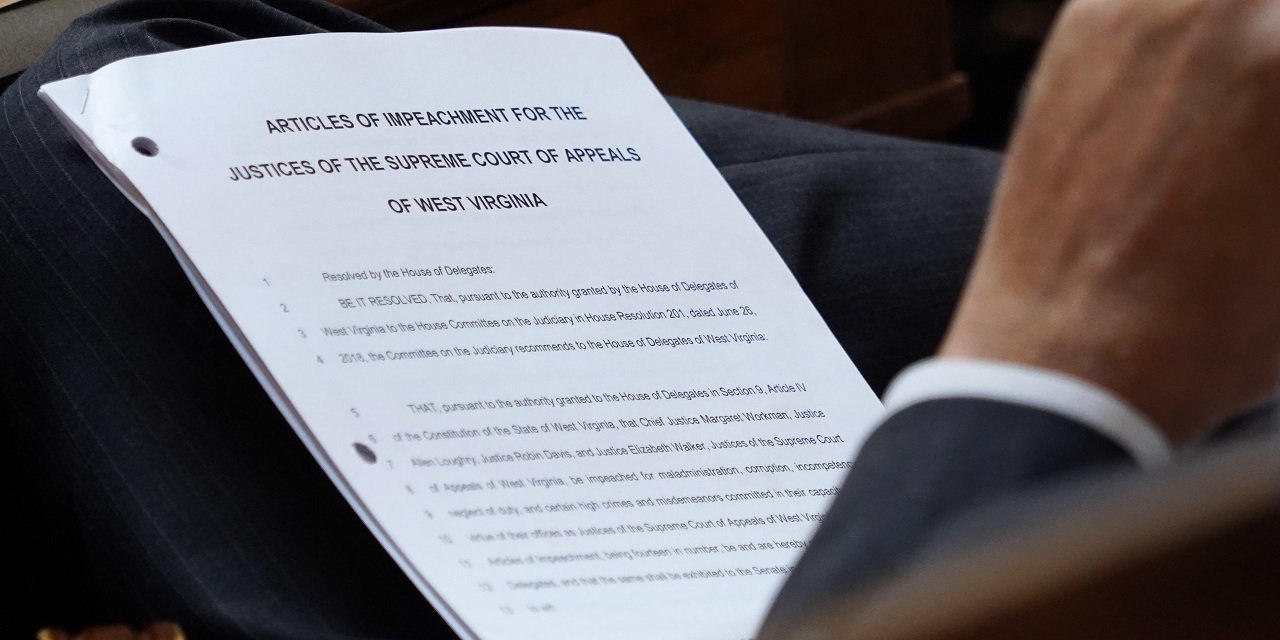CHARLESTON – The full state Senate will vote on a resolution saying state courts have no authority to interfere with impeachment proceedings in the House or state Senate.
On March 8, the Senate Judiciary Committee passed House Joint Resolution 2. The House of Delegates passed it last week. The full Senate would have to pass it by a two-thirds vote because it could result in a constitutional amendment. If that’s the case, voters would decide on that in the 2022 General Election.
“The House of Delegates shall have sole power of impeachment,” the state Constitution currently reads. “The Senate shall have sole power to try impeachment.”

Woelfel
The resolution would add language similar to this: “No court of this state has any authority or jurisdiction, by writ or otherwise, to intercede or intervene in, or interfere with, any impeachment proceedings of the House of Delegates or the Senate conducted hereafter. Nor is any judgment rendered by the Senate following a trial of impeachment reviewable by any court of this state.”
In 2018, the justices of the state Supreme Court were impeached for, among other things, office renovations and using state vehicles for private travel. Former Justice Margaret Workman filed a lawsuit arguing the impeachment stepped into the judiciary’s constitutional authority and that lawmakers hadn’t followed their own procedures.
The temporary panel of judges sitting as the state Supreme Court blocked the impeachment trials of all of the justices except Beth Walker, who already had had her trial in the state Senate. The House and Senate appealed that ruling to the U.S. Supreme Court, but it refused to hear the case.
Democrats are opposed, saying the proposal goes too far.
Senator Mike Woelfel (D-Cabell) came up with a hypothetical example of the Legislature wanting to impeach a Supreme Court justice simply because of their heritage.
“If we had a Chinese justice on the Supreme Court and we as a body wanted to impeach that person based on their national origin alone and that was clear … this bill would prevent the court from saying ‘Wait a minute you can’t impeach someone based on discriminatory views,'” Woelfel said.
An organization called West Virginia Citizens for Clean Elections calls the possible amendment unneeded, saying lawmakers already have the power.
“This amendment is not needed to restore or protect the legislature’s authority in impeachment proceedings, and would open the door to blatant abuses of power by the legislative branch,” the group’s website states. “Members of the House Judiciary Committee raised concerns that, rather than protecting the separation of powers, this amendment would erode the checks and balances between the three branches of government and could be used by future legislatures to punish political rivals without cause.
“The people of West Virginia agreed through our Constitution that impeachment proceedings must be conducted ‘according to law and evidence.’ The acting court explicitly made clear that its decision in Workman was ‘not about whether or not a Justice of the Supreme Court of Appeals of West Virginia can or should be impeached,’ but rather about the fact that it ‘must be done correctly and constitutionally with due process.’
“The only reason the acting court got involved was because the House of Delegates failed to follow its own impeachment rules.”
Workman’s attorney for her lawsuit regarding her impeachment agrees, saying the state already has provisions in place.
“The problem I have with the resolution is that West Virginia has a very specific Separation of Powers provision in the state Constitution which says the legislative branch, the executive branch and the judicial branch have definite roles and you can’t interfere with those roles,” Marc Williams told The West Virginia Record. “That’s actually one of the defenses we raised in our case. What they’re trying to do is to amend the state Constitution to eliminate the separation of powers enabling judicial oversight over impeachment.”
Williams, an attorney with Nelson Mullins in Huntington, said this is the third consecutive legislative session lawmakers have tried to overturn the state Supreme Court’s ruling in the Workman case in one way or another.
But if they are successful now with the Republican supermajority in both houses and voters affirm it as well, this will be part of the state Constitution.
“No matter how crazy or bad or flawed an impeachment proceeding is, a state court can not intervene to protect the party being impeached,” Williams said. “Let’s say someone decides to impeach a Democratic officeholder simply because they don’t like Democrats. It would be permissible, and there is no way to fight it in court.
“Same goes for a minority officeholder who is impeached simply because they’re a minority. There is nothing a state court could do about it.”
But, Williams said there still could be other remedies.
“Even if they amend the state Constitution to eliminate judicial review of impeachments, that wouldn’t keep a federal court from looking at it on federal constitutional grounds,” he said. “Like in the case of a minority being impeached simply because they’re Black, that would be a violation of the federal Constitution on the basis of discrimination. That would result in a federal court being able to intervene.
“They aren’t going to eliminate possibility of judicial review. But they make themselves feel better over a decision they think was wrong.”
